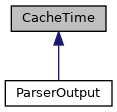Parser cache specific expiry check. More...

Public Member Functions | |
| containsOldMagic () | |
| expired ( $touched) | |
| Return true if this cached output object predates the global or per-article cache invalidation timestamps, or if it comes from an incompatible older version. More... | |
| getCacheExpiry () | |
| Returns the number of seconds after which this object should expire. More... | |
| getCacheRevisionId () | |
| getCacheTime () | |
| isCacheable () | |
| isDifferentRevision ( $id) | |
| Return true if this cached output object is for a different revision of the page. More... | |
| setCacheRevisionId ( $id) | |
| setCacheTime ( $t) | |
| setCacheTime() sets the timestamp expressing when the page has been rendered. More... | |
| setContainsOldMagic ( $com) | |
| updateCacheExpiry ( $seconds) | |
| Sets the number of seconds after which this object should expire. More... | |
Public Attributes | |
| $mCacheExpiry = null | |
| $mCacheRevisionId = null | |
| $mCacheTime = '' | |
| $mContainsOldMagic | |
| array bool | $mUsedOptions |
| ParserOptions which have been taken into account to produce output or false if not available. More... | |
| $mVersion = Parser::VERSION | |
Detailed Description
Parser cache specific expiry check.
Definition at line 29 of file CacheTime.php.
Member Function Documentation
◆ containsOldMagic()
| CacheTime::containsOldMagic | ( | ) |
- Returns
- bool
Definition at line 50 of file CacheTime.php.
References $mContainsOldMagic.
Referenced by getCacheExpiry().
◆ expired()
| CacheTime::expired | ( | $touched | ) |
Return true if this cached output object predates the global or per-article cache invalidation timestamps, or if it comes from an incompatible older version.
- Parameters
-
string $touched the affected article's last touched timestamp
- Returns
- Boolean
Definition at line 161 of file CacheTime.php.
References getCacheExpiry(), getCacheTime(), global, isCacheable(), TS_MW, and wfTimestamp().
◆ getCacheExpiry()
| CacheTime::getCacheExpiry | ( | ) |
Returns the number of seconds after which this object should expire.
This method is used by ParserCache to determine how long the ParserOutput can be cached. The timestamp of expiry can be calculated by adding getCacheExpiry() to getCacheTime(). The value returned by getCacheExpiry is smaller or equal to the smallest number that was provided to a call of updateCacheExpiry(), and smaller or equal to the value of $wgParserCacheExpireTime.
- Returns
- int|mixed|null
Definition at line 120 of file CacheTime.php.
References $mCacheExpiry, containsOldMagic(), and global.
Referenced by expired(), and isCacheable().
◆ getCacheRevisionId()
| CacheTime::getCacheRevisionId | ( | ) |
- Since
- 1.23
- Returns
- int|null Revision id, if any was set
Definition at line 76 of file CacheTime.php.
References $mCacheRevisionId.
Referenced by isDifferentRevision().
◆ getCacheTime()
| CacheTime::getCacheTime | ( | ) |
- Returns
- string TS_MW timestamp
Definition at line 43 of file CacheTime.php.
References TS_MW, and wfTimestamp().
Referenced by expired().
◆ isCacheable()
| CacheTime::isCacheable | ( | ) |
- Returns
- bool
Definition at line 149 of file CacheTime.php.
References getCacheExpiry().
Referenced by expired().
◆ isDifferentRevision()
| CacheTime::isDifferentRevision | ( | $id | ) |
Return true if this cached output object is for a different revision of the page.
- Todo:
- We always return false if $this->getCacheRevisionId() is null; this prevents invalidating the whole parser cache when this change is deployed. Someday that should probably be changed.
- Since
- 1.23
- Parameters
-
int $id the affected article's current revision id
- Returns
- Boolean
Definition at line 183 of file CacheTime.php.
References getCacheRevisionId().
◆ setCacheRevisionId()
| CacheTime::setCacheRevisionId | ( | $id | ) |
◆ setCacheTime()
| CacheTime::setCacheTime | ( | $t | ) |
setCacheTime() sets the timestamp expressing when the page has been rendered.
This does not control expiry, see updateCacheExpiry() for that!
- Parameters
-
$t string
- Returns
- string
Definition at line 68 of file CacheTime.php.
References $t, and wfSetVar().
◆ setContainsOldMagic()
| CacheTime::setContainsOldMagic | ( | $com | ) |
◆ updateCacheExpiry()
| CacheTime::updateCacheExpiry | ( | $seconds | ) |
Sets the number of seconds after which this object should expire.
This value is used with the ParserCache. If called with a value greater than the value provided at any previous call, the new call has no effect. The value returned by getCacheExpiry is smaller or equal to the smallest number that was provided as an argument to updateCacheExpiry().
- Parameters
-
$seconds number
Definition at line 98 of file CacheTime.php.
Referenced by ParserCache\save().
Member Data Documentation
◆ $mCacheExpiry
| CacheTime::$mCacheExpiry = null |
Definition at line 36 of file CacheTime.php.
Referenced by getCacheExpiry().
◆ $mCacheRevisionId
| CacheTime::$mCacheRevisionId = null |
Definition at line 38 of file CacheTime.php.
Referenced by getCacheRevisionId().
◆ $mCacheTime
| CacheTime::$mCacheTime = '' |
Definition at line 35 of file CacheTime.php.
◆ $mContainsOldMagic
| CacheTime::$mContainsOldMagic |
Definition at line 36 of file CacheTime.php.
Referenced by containsOldMagic().
◆ $mUsedOptions
| array bool CacheTime::$mUsedOptions |
ParserOptions which have been taken into account to produce output or false if not available.
Definition at line 32 of file CacheTime.php.
◆ $mVersion
| CacheTime::$mVersion = Parser::VERSION |
Definition at line 34 of file CacheTime.php.
The documentation for this class was generated from the following file:
- includes/parser/CacheTime.php
